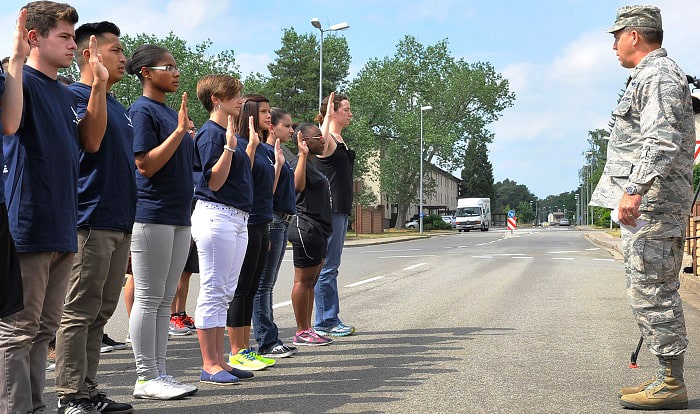While searching for enlistment options in the military, you will likely come across the acronym ‘DEP’ and be confused about what it entails. Fortunately, the DEP meaning military is rather straightforward.
So, what is DEP military?
The three letters stand for Delayed Entry Program. It is for those who want to commit to the military but ship out at a later date. Learn all the details by continuing to read!
Table of Contents
Military DEP
As mentioned above, DEP is an acronym for “Delayed Entry Program.” It is also sometimes referred to as the “Delayed Enlistment Program.” It is available in each branch of the military. Thus, you can also come across branch-specific names.
- The Army calls it The Future Soldiers Program.
- The Navy Delayed Entry Program is dubbed The Future Sailors Program.
It allows military enlistees to commit to reporting for training on a specific date. But these enlistees are not considered active-duty service members until they enlist formally on the specified date.
When an enlistee commits to DEP, he or she is really enlisting into the inactive reserves. It is possible for him or her to stay in DEP for up to 365 days.
Who Would Consider the DEP?
- Those who are not old enough to sign the military’s legally binding contract and commit yet
- Those who have not graduated high school yet
- Those who did not graduate and are pursuing a GED or equivalent alternative
- Those who do not meet the fitness standards to enter basic training yet
- Those who have commitments to fulfill and so, must shop out basic training later
Examples of commitments are college classes or changes in family status
- Those who have satisfied enlistment requirements but are seeking a job that is not available yet
Benefits of The DEP
- Opportunity To Periodically Take The Initial Strength Test
You can periodically take the IST to gauge your progress and guarantee that you are fit for basic training when you ship out.
- Chance To Connect with Others Early On
You and your family can attend family nights with other members of DEP. So, you can make friends early and your family can develop supportive connections as well.
Army DEP
When soldiers sign up for DEP, they are welcomed by an orientation program with important details on their commitments to the program and to basic training.
They will have to complete the DD Form 2983 (Recruit/Trainee Prohibited Activities Acknowledgement) and ensure they are aware of the restrictions on enlistees.
Then, they will create an account on GoArmy to access training modules. They will also discuss with their recruiter about:
- The significance of maintaining mental, physical, and moral eligibility
- How to schedule an Occupational Physical Assessment test and the requirements for it
- Future Soldier training schedules
- Basic training requirements, packing lists, etc.
The recruiter will also communicate clearly that the enlistees are expected to:
- Contact the recruiter every 2 weeks
- Hold one office meeting with the recruiter every month
Enlistees can stay on DEP status for up to 365 days. During that time, they can participate in Army fitness programs.
- Note: The National Guard also gives enlistees up to 365 days in the DEP.
Marine Corps DEP
The Marines Delayed Entry Program provides enlistees with “a guaranteed program in writing” and “the opportunity for accelerated promotion as part of the program.”
Enlistees on DEP status can stay for up to 410 days, though 365 days is the typical maximum.
As with the Army’s Delayed Entry Program, enlistees in the Marine Corps DEP connect with a recruiter who provides mentorship, guidance, and support. The recruiter will also assist the enlistee in preparing for recruit training.
One unique aspect of the Marine Corps DEP is the Buddy Program. According to the Marine official site, enlistees can ship out to basic training with a friend thanks to this additional program.
Like the other DEPs, the Navy’s program stresses that enlistees prepare for basic training.
And so, the branch offers the “Navy START Guide.”
DEP enlistees are expected to become familiar with the information in this guide. Afterward, enlistees head into an orientation process that lasts 72 hours. Navy DEP enlistees may remain in DEP status for a few months up to 365 days.
A distinct aspect of the Navy’s program is the chance for enlistees to practice taking on a leadership role: a Recruit Petty Officer. He or she will refer the required number of applicants to a Navy recruiter during a rolling 12-month period and if they do so successfully, may qualify for recognition.
Air Force DEP
The Air Force DEP is primarily meant for enlistees waiting on a specific desired job. According to the Air Force official site, “DEP allows you to finish your application to the Air Force and reserve your job before an assignment is available.”
The general requirements of a DEP enlistee include:
- Staying in touch with the recruiter on a weekly basis
- Performing self-paced or self-directed physical fitness programs
Depending on where you sign up, the proximity of the recruiter, and other factors, there may be organized fitness activities available to you
- Observing the fundamental rules of conduct for being in the program
Coast Guard DEP
After signing up for the Coast Guard, you can ship out to basic training at the earliest available time or enroll in the DEP program for up to 12 months. This time is for you to arrange and sort out any personal affairs to fully commit to serving.
There is not much information on the program online. So, reach out to a recruiter if you need additional information.
The Typical DEP Enrollment Process
The rules and procedures for enrolling in the DEP can change depending on many factors, such as federal law, current guidance, mission requirement, etc. So, for the most up to date information, you will need to reach out to a recruiter.
You can also go online to search for details.
However, keep in mind that each branch will have information published for public consumption with varying levels of details.
To enroll in the DEP, you will first need to meet with a recruiter. You can discuss matters relating to the DEP with this recruiter. But don’t worry; you will not yet be obligated to any military service.
- Note: The recruiter will also help you begin the basic screening and interview process for enlistment.
Only after you commit in writing to the program, will your meetings with the recruiter be official. And by then, you will be considered a DEP-er.
When you sign the DEP enlistment contract, it is legally binding that you report to the designated place at the time stated.
Frequently Asked Questions (FAQs)
What are you called when you enter the Delayed Entry Program (DEP)?
When you enter the DEP, you may be referred to as “DEP-ers.”
In this article, we call such personnel “enlistees.” You may also be described as being on “DEP status.” But there is no need to be too technical about it.
Can I opt out of the Delayed Entry Program (DEP)?
Yes, it is possible. You can request to be released from the program, and will be able to do so once you get approval from the Secretary of your branch of service.
But it will not be very easy. You will have to be firm with your reasoning.
The recruiter will feel as though everything they (and the recruiting officer) have done will be wasted. So, they will try to talk you back into the program and consequently, ship you out to training as scheduled. They might try to intimidate you into staying committed.
But note that recruiters are not allowed to use threats, like “You’ll go to jail.” They are legally bound to let you go if you complete all the necessary steps.
What do I need to do to opt out of the Delayed Entry Program (DEP)?
- DEP Discharge Procedures
Your request for discharge from the DEP needs to be in writing. In the letter, you must state that you are requesting to be discharged from the DEP and why. You can list reasons like:
- Dependency
- Enlistment misunderstanding
- Enlistment in another service
- Failure to graduate high school
- Marriage
- Medical disqualification
- Personal problems
- Pursuit of higher education
- Pregnancy
Pass the letter to your recruiter. He or she will forward it to their commander.
In some cases, you may be asked to meet with the recruiting commander or a discharge board, where those present will try to change your mind. But these are not mandatory.
- DEP Discharge Processing
In general, a DEP discharge request should take up to about 30 days to process. Even if the request is delayed or disapproved, you will still be discharged from the DEP automatically when the shipping date comes and you do not ship to basic training.
Since the rule is that an enlistee can only be in the DEP for a maximum of 365 days, at the end of a year, you are automatically discharged from the DEP, regardless if your request has been processed.
Again, remember that if your DEP discharge request is approved or denied, it should be in writing.
When you discharge, you will not receive a DD Form 214. Instead, you will receive a simple and short letter stating that you have been discharged from the DEP.
Is it bad to opt out of the Delayed Entry Program (DEP)?
Your request will entail a DEP “Entry Level Separation” (ELS) discharge.
This type of discharge is not characterized. Therefore, it is not “Honorable,” “General,” or “Under Other Than Honorable.” It’s simply not anything. Plus, you will not receive a Reenlistment Eligibility (RE) Code that will dim your chances of joining the same (or another) service branch in the future.
Still, there is one negative effect of a DEP discharge: when you enlist in the future in the same service, you will need to have a waiver. There is a chance that you will lose certain benefits, like the ability to choose a job or the date you will ship out to basic training.
Will the recruiter intimidate me if I opt out of the Delayed Entry Program (DEP)?
They might try to. But, in terms of regulations, they are not allowed to. So, if they do, you should:
- Use the chain of command to request the name and phone number of your recruiter’s supervisor
- Keep doing it until you get a response
- Let the supervisor and recruiter know you are not hesitant to make an official written complaint to the “Inspector Generals” (IG).
- Note: The Recruiting “IG” officials are those who investigate allegations of recruiter misconduct or violations of recruiting regulations and policies.
As a last resort, you can contact your Congressperson. Congressional intervention can help you address a recruiter or recruiting commander using unethical tactics, like delaying the DEP discharge request.
Conclusion
Now you know all the essential information relating to, “What is DEP Military?” Hopefully, this has been informative and interesting. If you have any further questions, feel free to leave us a comment. We highly recommend you bookmark this for future reference, as well. Please help us share this with others who need this information, too!
For more details on other military jargon, visit the following articles:

I am Everett Bledsoe, taking on the responsibility of content producer for The Soldiers Project. My purpose in this project is to give honest reviews on the gear utilized and tested over time. Of course, you cannot go wrong when checking out our package of information and guide, too, as they come from reliable sources and years of experience.




